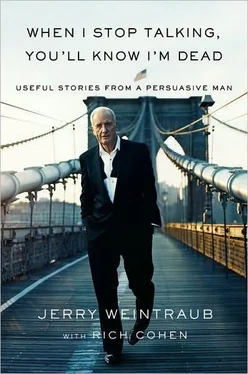Finally, late that night, I got a call back from an old friend. He said there was a guy in Seattle named Lester Smith who owned radio stations, lots of radio stations, and was a tremendous Elvis fan-this guy might give you the money just to be in business with Presley. So I called the guy-his business manager was on an extension-and I made the pitch. They wanted to see proposals, papers, and so on. I didn't blame them. I would want to see these things, too, but there was no time. "I would like to," I told him, "but I have just a few hours to get a check and meet Colonel Parker in Vegas. So, at this point, it's yes or no. You're going to have to trust me on the rest."
As he was saying yes, I was getting my keys, pulling on my coat, heading out the door. I went to the airport and got a plane. I stared out the window at the desert. I took a cab to the hotel, checked into my room, called the Colonel. "I'm getting the money," I told him, "but I'm going to need a little more time."
"All right," he said. "You have till three P.M. But that's it. You know where to meet me."
I rushed over to the bank, one of those cash-and-carry places downtown. What a sight! The place had a gold crown over the door and it was all purple and it looked less like a bank than a whorehouse. I went to the woman at the front desk. "My name is Jerry Weintraub," I told her. "I'm waiting for a million dollar wire transfer. I'm going to need a cashier's check for the same amount." She looked at me like I was nutty, maybe a bank robber. I had long hair in those days, sideburns and boots, and I was telling this girl I planned to leave there with a million dollars. I sat in a big chair, looking through the windows as I waited for the money to come in. It was a strange afternoon, spent suspended between my life as it had been and my life as it was going to be. Elvis was the biggest star in the world. If I took him on the road, if I promoted him, nothing would be the same. I knew that. Finally, after I had been daydreaming for two hours-I was pushing against the new deadline-the president of the bank, a young guy, asked me to follow him into his office.
"Your cashier's check is being prepared, Mr. Weintraub."
"Right."
"It's made out to Elvis Presley… One million dollars."
"Great."
"That's a lot of money."
"Yes, it sure is."
"What do you plan to do with it?"
"I'm taking Elvis on tour," I said.
This guy's eyes lit up. He said, "Do you need an accountant?"
"I know how you feel," I told him, "and let me think about it, but right now, I need to get that check and get over there or I'm going to miss the Colonel and no one will be going anywhere."
"Of course," he said, giving me the check, this monstrous check. I looked at it and shivered, folded it into my breast pocket, ran out, and caught a cab to the Hilton. I spotted the Colonel as soon as I walked onto the casino floor. You could not miss him. He was wearing a white cowboy hat and a ratty short-sleeved shirt, chomping a cigar. He looked like the guy ripping you off at the county fair. He was the hero of his own movie.
"Colonel Tom Parker?"
"You Jerry Weintraub?"
"Yes, sir."
He looked at me skeptically, through one eye, then asked, "You got the money?"
"I do."
"Wait a minute," he told me, "I want to finish this spin"-he was playing roulette, which is a sucker's game-then said, "Okay, follow me."
We went up to his suite, where he had a little office. He sat behind his desk, then said, "Let's have it."
I took the check out of my pocket, unfolded it, handed it to him. He looked at it for a moment, unlocked a safe, put the check inside, then said, "Okay, Jerry, what do you want to do with my boy?"
"Take him out on the road."
"Good! Let's do it."
Thinking back, I realize there were no papers, no contracts, no nothing. I handed him the check, he took the check, that's it.
The Colonel was amazing. As an old carnie, he really understood how to package and sell. He began in the music business in the 1940s promoting country acts like Minnie Pearl and Hank Snow and Eddie Arnold, but he did not get into the chips until he signed Elvis to a management contract in 1954. He built Presley's career from there, moving him from Sun Records to RCA Victor, getting him into movies, and, in the process, turning the kid from Tupelo into the king of rock and roll. Some critics thought Elvis lost authenticity in the process, but the Colonel was always a big marketing man. If you were walking this earth, he wanted to sell to you. He was, in this way, a true egalitarian. He wanted no one left out. He once scolded me, saying, "To you guys from the coasts, the country is New York and LA. Everything in between is just the blur you fly over. But I'll tell you, that blur is where the audience lives and where you make your money."
I remember the first time I went to his house. He had a statue garden in the yard, with these odd ceramic animals and plastic flamingos. His taste was not my taste-it came from the carnival, the midway. To him, art was a pink elephant. But he taught me how to look at other parts of America. To understand this country, you must understand the paintings in the Whitney Museum in New York, or know how to pretend to, but you must also understand the flamingos in Colonel Tom's garden. To this day, if you go to my office at Warner Bros., you will see, out front, two plastic flamingos in the grass. This is to remind me where I come from: from the Bronx, yes, but also from the school of Colonel Tom Parker, who taught me how to hawk my wares in every part of America.
People later said the Colonel stole from Elvis, took too much, or did not treat him right. He was vilified. But, as far as I'm concerned, none of that's true. The Colonel never stole anything from Elvis. If he had, I would have known it. I was there. Elvis made all the artistic decisions and did exactly what he wanted to do. Business and promotion-that was what the Colonel cared about. As for the movies, which some people didn't like, Colonel Parker had just two rules. One: It had to have ten songs, because ten songs made a record. Two: Elvis got paid one million dollars. This neat sum, one million, the Colonel loved it. It rolled off his tongue.
Years later, I was at a meeting at the Beverly Wilshire with Colonel Parker and Hal Wallis, a Paramount producer who worked with Elvis on many movies, including Love Me Tender. He wanted Elvis for Harum Scarum, a Rudolph Valentino-type film. After going through various details, the men finally got to the salary. "Well, look, Colonel, I know the usual terms," said Wallis, "but this is a different kind of movie, with a different kind of budget. We can't pay Elvis a million dollars."
"You know what he gets," said the Colonel. "Give us the money, tell us where to be, and we'll make a movie. If not, I'm not sure why you're here."
"You don't understand," said Wallis. "This is an Academy Award film. Elvis is going to win the Academy Award."
"Oh, you're right, I didn't understand," said the Colonel. "An Academy Award! That is something. Tell you what, Hal. You give me a million dollars, and when he gets the Academy Award, I will give you back five hundred thousand."
Wallis then went directly to Elvis. "I have something amazing for you," he said. "You will play a role like Rudolph Valentino would have played. You will look like Valentino in The Sheik. He was the most handsome man in the world; you will be more handsome. This is going to make you into a great actor as well as a movie star."
"Okay," said Elvis, "but who was Valentino? I don't know anything about him."
"We'll get you books," says Wallis. "You'll learn all about him."
So Elvis starts reading up on Valentino, and learns, among other things, that Valentino was nasty, temperamental, and hard to work with, and always came late to the set. So what does Elvis do? Well, he's an actor now. He becomes Valentino. He behaves in a way he never behaved. If you wanted to do a picture with Elvis in eighteen days, it was done in eighteen days. If you wanted him on the set at 6:00 A.M., he was there at 5:30. Now he's coming late and he is leaving early, disappearing, ignoring direction. Nobody can control him. Hal Wallis finally calls the Colonel. He says, "Colonel, you've got to do something about Elvis."
Читать дальше

![Сьюзан Кейн - Quiet [The Power of Introverts in a World That Can't Stop Talking]](/books/33084/syuzan-kejn-quiet-the-power-of-introverts-in-a-wo-thumb.webp)










